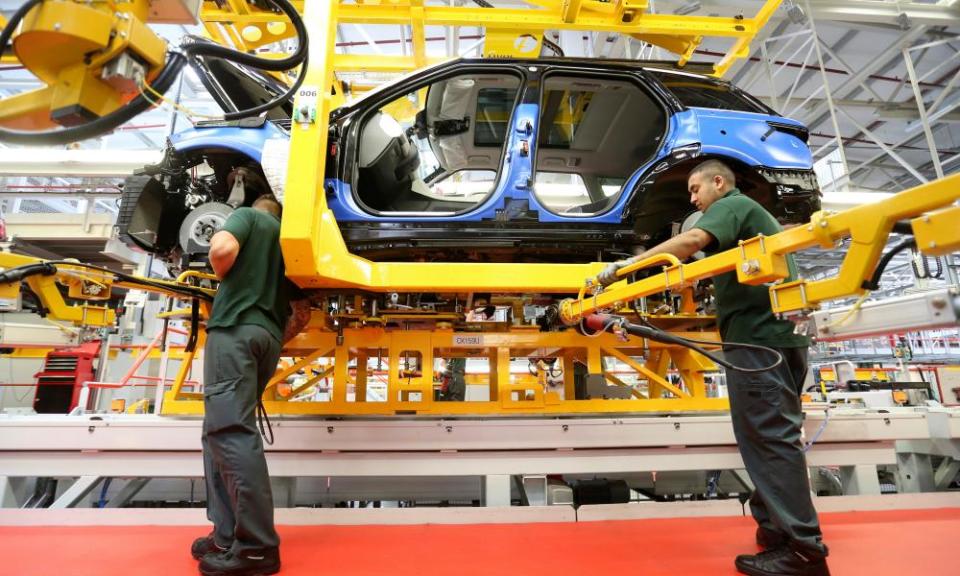Lack of skilled EU workers 'could choke UK growth post-Brexit'

Manufacturers are demanding that the government provide urgent clarity on the future of EU workers’ rights, warning they will face shortages of skilled staff if they cannot recruit from Europe after Brexit.
EEF, the manufacturers’ organisation, said a quarter of the firms it represents had seen job applications from the EU fall and 16% had seen more European workers quit since the 2016 referendum.
With a majority relying on EU staff due to a lack of skilled UK applicants, manufacturers warned that uncertainty over recruitment would choke off growth and damage the British economy.
The reciprocal rights of EU and UK workers is one of the core questions in the Brexit negotiations, with the prime minister having confirmed that freedom of movement must be limited, despite business fears and cabinet objections. However, the government has indicated it will seek a transitional period following the article 50 deadline of March 2019.
Somewhere between zero and €100bn (£84bn) is probably the only accurate answer at the moment. The former is what some British ministers still argue for, drawing succour from an influential House of Lords report that suggests any liability arising on leaving the EU is not legally enforceable because the UK will have left.
This so-called golf club argument is vigorously contested by most other EU governments, who insist all financial obligations must be met before they will agree to any future trade deal. The figure of €100bn is the latest in a series of back-of-the-envelope estimates by journalists and thinktanks who have attempted to tot up those obligations. Previously the consensus among the same experts was €60bn.
A report published by EEF says that while manufacturers are looking to bring in more apprenticeships and training, these can only be long-term solutions, with 11% of staff now coming from the EU and many vacancies attracting no UK applicants.
It warned that skills shortages would worsen should post-Brexit restrictions mean a cap on EU staff as well as non-EU staff employed by firms, with three quarters of manufacturers surveyed saying they were already struggling to fill roles.
Tim Thomas, EEF director of employment and skills, said: “Preventing industry from being able to recruit the best skilled workers from the EU could stifle growth, damage British industry and the UK economy as a whole.
“As a priority the government should clarify the reciprocal rights of EU nationals in the UK and British nationals currently working in other EU member states. Skills shortages are endemic in manufacturing and engineering, and any points-based type system would choke off the skills needed by this sector.”
EEF has urged that skilled European workers should have the right to work in the UK for up to five years and then apply for permanent residency, and that EU nationals should continue to be able to come to study in the UK and seek ensuing employment here. The manufacturers also urged that rules be relaxed again to allow non-EU students to stay after graduation for two years to seek skilled employment.
The EEF survey follows other warnings of a “brain drain” after Brexit, with a KPMG survey suggesting that almost a million highly skilled EU citizens were planning to leave the UK. The figures showed that the intention to leave was most prevalent among the best qualified and highest paid EU nationals living in the UK, including half of those with postgraduate qualifications.
Meanwhile, German industrialists have criticised the UK government’s negotiating stance. “The British government is lacking a clear direction of travel,” said Dieter Kempf, head of the German employers’ association BDI. “In spite of British cabinet members declaring a united front, there is no discernible coordinated line on behalf of the government.
“These are poor preconditions for the third round of negotiations. Noteworthy progress can hardly be expected. British proposals for managing customs come with disproportionately high amount of additional bureaucracy.
“For businesses these ideas are impractical. The United Kingdom has at last got to deliver unambiguous statements on the modalities of leaving [the European Union].”

 Yahoo Finance
Yahoo Finance 